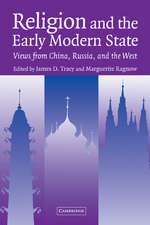Criminals and their Scientists: The History of Criminology in International Perspective: Publications of the German Historical Institute
Editat de Peter Becker, Richard F. Wetzellen Limba Engleză Hardback – 8 ian 2006
| Toate formatele și edițiile | Preț | Express |
|---|---|---|
| Paperback (1) | 406.80 lei 6-8 săpt. | |
| Cambridge University Press – 30 sep 2009 | 406.80 lei 6-8 săpt. | |
| Hardback (1) | 870.01 lei 6-8 săpt. | |
| Cambridge University Press – 8 ian 2006 | 870.01 lei 6-8 săpt. |
Din seria Publications of the German Historical Institute
- 8%
 Preț: 530.72 lei
Preț: 530.72 lei -
 Preț: 283.52 lei
Preț: 283.52 lei - 14%
 Preț: 757.52 lei
Preț: 757.52 lei - 14%
 Preț: 757.52 lei
Preț: 757.52 lei -
 Preț: 352.63 lei
Preț: 352.63 lei - 11%
 Preț: 695.06 lei
Preț: 695.06 lei -
 Preț: 299.45 lei
Preț: 299.45 lei -
 Preț: 207.41 lei
Preț: 207.41 lei -
 Preț: 282.17 lei
Preț: 282.17 lei - 11%
 Preț: 574.38 lei
Preț: 574.38 lei -
 Preț: 289.39 lei
Preț: 289.39 lei -
 Preț: 327.41 lei
Preț: 327.41 lei -
 Preț: 439.33 lei
Preț: 439.33 lei - 11%
 Preț: 552.00 lei
Preț: 552.00 lei - 11%
 Preț: 524.04 lei
Preț: 524.04 lei - 11%
 Preț: 458.99 lei
Preț: 458.99 lei - 14%
 Preț: 871.52 lei
Preț: 871.52 lei - 14%
 Preț: 1279.78 lei
Preț: 1279.78 lei - 14%
 Preț: 755.87 lei
Preț: 755.87 lei -
 Preț: 453.12 lei
Preț: 453.12 lei - 14%
 Preț: 756.70 lei
Preț: 756.70 lei -
 Preț: 331.28 lei
Preț: 331.28 lei -
 Preț: 318.06 lei
Preț: 318.06 lei - 14%
 Preț: 755.69 lei
Preț: 755.69 lei -
 Preț: 353.83 lei
Preț: 353.83 lei -
 Preț: 321.90 lei
Preț: 321.90 lei -
 Preț: 284.78 lei
Preț: 284.78 lei - 14%
 Preț: 937.61 lei
Preț: 937.61 lei -
 Preț: 471.93 lei
Preț: 471.93 lei - 11%
 Preț: 578.20 lei
Preț: 578.20 lei - 11%
 Preț: 589.88 lei
Preț: 589.88 lei -
 Preț: 315.72 lei
Preț: 315.72 lei - 11%
 Preț: 693.36 lei
Preț: 693.36 lei -
 Preț: 287.07 lei
Preț: 287.07 lei - 23%
 Preț: 950.10 lei
Preț: 950.10 lei -
 Preț: 384.34 lei
Preț: 384.34 lei -
 Preț: 448.49 lei
Preț: 448.49 lei - 5%
 Preț: 312.62 lei
Preț: 312.62 lei -
 Preț: 319.52 lei
Preț: 319.52 lei -
 Preț: 422.91 lei
Preț: 422.91 lei -
 Preț: 243.74 lei
Preț: 243.74 lei
Preț: 870.01 lei
Preț vechi: 1011.64 lei
-14% Nou
Puncte Express: 1305
Preț estimativ în valută:
166.50€ • 170.51$ • 138.50£
166.50€ • 170.51$ • 138.50£
Carte tipărită la comandă
Livrare economică 18 martie-01 aprilie
Preluare comenzi: 021 569.72.76
Specificații
ISBN-13: 9780521810128
ISBN-10: 0521810124
Pagini: 510
Dimensiuni: 158 x 234 x 37 mm
Greutate: 0.81 kg
Editura: Cambridge University Press
Colecția Cambridge University Press
Seria Publications of the German Historical Institute
Locul publicării:New York, United States
ISBN-10: 0521810124
Pagini: 510
Dimensiuni: 158 x 234 x 37 mm
Greutate: 0.81 kg
Editura: Cambridge University Press
Colecția Cambridge University Press
Seria Publications of the German Historical Institute
Locul publicării:New York, United States
Cuprins
Part I. Non-academic Sites of Nineteenth-Century Criminological Discourse: 1. The French Revolution and the origins of French criminology Marc Renneville; 2. Murderers and 'reasonable men': the 'criminology' of the Victorian Judiciary Martin J. Wiener; 3. Unmasking counterhistory: an introductory exploration of criminality and the Jewish question Michael Berkowitz; 4. Moral discourse and reform in urban Germany, 1880s–1914 Andrew Lees; 5. The criminologists' gaze at the underworld: toward an archaeology of criminological writing Peter Becker; Part II. Criminology as Scientific and Political Practice in the Late Nineteenth and Early Twentieth Centuries: 6. Cesare Lombroso and Italian criminology: theory and politics Mary S. Gibson; 7. Criminal anthropology: its reception in the United States and the nature of its appeal Nicole Hahn Rafter; 8. From the 'atavistic' to the 'inferior' criminal type: the impact of the Lombrosian theory of the born criminal on German psychiatry Mariacarla Gadebusch Bondio; 9. Criminology, hygienism, and eugenics in France, 1870–1914: the medical debates on the elimination of 'incorrigible' criminals Laurent Muccielli; 10. Crime, prisons, and psychiatry: reconsidering problem populations in Australia, 1890–1930 Stephen Garton; 11. Positivist criminology and state formation in modern Argentina, 1890–1940 Ricardo D. Salvatore; 12. The birth of criminology in modern Japan Yoji Nakatani; Part III. The Making of the Criminologist: 13. The international congresses of criminal anthropology: shaping the French and international criminological movement, 1886–1914 Martine Kaluszynski; 14. Making criminologists: tools, techniques, and the production of scientific authority David G. Horn; 15. 'One of the strangest relics of a former state': tattoos and the discourses of criminality in Europe, 1880–1920 Jane Caplan; 16. What criminals think about criminology: French criminals and criminological knowledge at the end of the nineteenth century Philippe Artières; 17. Talk of the town: the murder of Lucie Berlin and the production of local knowledge Peter Fritzsche; Part IV. Criminology in the First Half of the Twentieth Century: The Case of Weimar and Nazi Germany: 18. Criminology in Weimar and Nazi Germany Richard F. Wetzell; 19. The Biology of mortality: criminal biology in Bavaria, 1924–33 Oliver Liang; 20. Criminals and their analysts: psychoanalytic criminology in Weimar Germany and the first Austrian Republic Gabriel N. Finder; 21. Drinking and crime in modern Germany Geoffrey J. Giles.
Recenzii
"...an excellent example of the kind of fruitful, elucidating, and exciting ideas that can result from international scholarly exchanges...[Becker and Wetzell] are to be commended for assembling such a varied and yet surprisingly focused collection of writings that will provide historians with new methods and models for thinking about the history of crime and punishment in world-historical perspective."
H-France Review, Allyson J. Delnore, Marquette University.
"...well documented and carefully reasoned essays dealing with the historical core of criminology..." -Roberta Panzarella, The American Journal of Legal History
"...the thrust and the content of the book works well....this is an important collection that no one interested in criminal justice in the nineteenth and early twentieth centuries can afford to ignore."
--Clive Emsley, Open University, The International History Review
H-France Review, Allyson J. Delnore, Marquette University.
"...well documented and carefully reasoned essays dealing with the historical core of criminology..." -Roberta Panzarella, The American Journal of Legal History
"...the thrust and the content of the book works well....this is an important collection that no one interested in criminal justice in the nineteenth and early twentieth centuries can afford to ignore."
--Clive Emsley, Open University, The International History Review
Descriere
A history of criminology as a history of science and practice.












